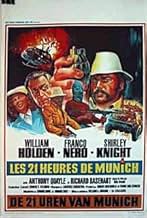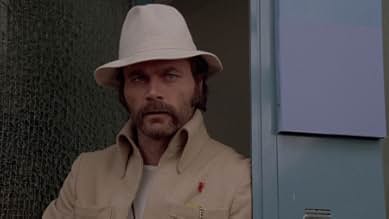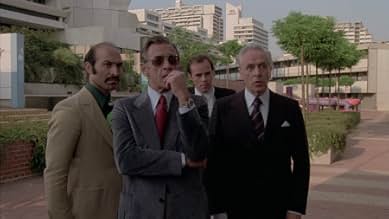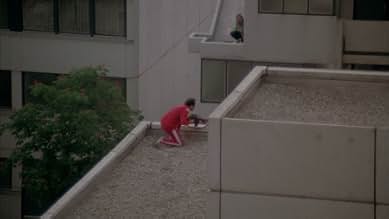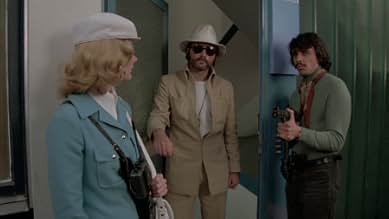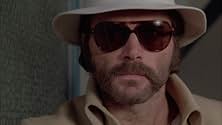IMDb RATING
6.3/10
1.3K
YOUR RATING
A dramatization of the incident in 1972 when Arab terrorists broke into the Olympic compound in Munich and murdered eleven Israeli athletes.A dramatization of the incident in 1972 when Arab terrorists broke into the Olympic compound in Munich and murdered eleven Israeli athletes.A dramatization of the incident in 1972 when Arab terrorists broke into the Olympic compound in Munich and murdered eleven Israeli athletes.
- Director
- Writers
- Stars
- Nominated for 2 Primetime Emmys
- 3 nominations total
Djamchid 'Jim' Soheili
- Touny
- (as Djamchid Soheili)
- Director
- Writers
- All cast & crew
- Production, box office & more at IMDbPro
Featured reviews
Released only one Olympic cycle after the actual events occurred during the 1972 Olympics, this film documents many of the behind-the-scenes events that happened while the world watched the horrible drama unfold. As a big fan of the Olympics, I was watching as news stories interrupted the peaceful competition to explain the unthinkable had happened.
Terrorists had invaded the Olympic compound--the ultimate symbol of peaceful coexistence--and killed Israeli athletes, taking others hostage as leverage to demand the release of comrades held in captivity. As a viewer, I vividly remember the shadowy image of a man on a balcony, a man who threatened the Olympic principles and the world at large, but somehow, though he was visible, was beyond the reach of retaliation. It was frustrating and tragic, but hostages' lives were in the balance.
This film was no doubt an attempt to fill in the blanks for many people who only saw those shadowy images from a distance. But is it more than a documentation? Is it a warning to the world or to those who would use terrorism for their political purposes? Or a tribute, perhaps, to those who did their best to tragic events that unfolded or those who were the victims of those who promote the initiation of violence (even against civilians) as a means to an end?
The narrative seems to bear few embellishments to the actual events of 1972. Hostage situations--with all of the accompanying negotiations and strategizing--are dramatic enough. William Holden, as chief of police, adequately portrays a man who will forever second guess his decisions. The leader of the terrorists (Franco Nero), becomes more than a shadowy figure as the film shows moments when his humanity is revealed. Presented with the option to walk away from further bloodshed, he says, "And have people think I am a coward?" When I first heard this line in 1976, I thought it referred to the world at large, but now I wonder if he was thinking about others who sympathized with his world view.
Terrorists had invaded the Olympic compound--the ultimate symbol of peaceful coexistence--and killed Israeli athletes, taking others hostage as leverage to demand the release of comrades held in captivity. As a viewer, I vividly remember the shadowy image of a man on a balcony, a man who threatened the Olympic principles and the world at large, but somehow, though he was visible, was beyond the reach of retaliation. It was frustrating and tragic, but hostages' lives were in the balance.
This film was no doubt an attempt to fill in the blanks for many people who only saw those shadowy images from a distance. But is it more than a documentation? Is it a warning to the world or to those who would use terrorism for their political purposes? Or a tribute, perhaps, to those who did their best to tragic events that unfolded or those who were the victims of those who promote the initiation of violence (even against civilians) as a means to an end?
The narrative seems to bear few embellishments to the actual events of 1972. Hostage situations--with all of the accompanying negotiations and strategizing--are dramatic enough. William Holden, as chief of police, adequately portrays a man who will forever second guess his decisions. The leader of the terrorists (Franco Nero), becomes more than a shadowy figure as the film shows moments when his humanity is revealed. Presented with the option to walk away from further bloodshed, he says, "And have people think I am a coward?" When I first heard this line in 1976, I thought it referred to the world at large, but now I wonder if he was thinking about others who sympathized with his world view.
I was 16 when the Israeli massacre occurred in Munich 33 yrs ago today and this made for TV film is an excellent feature about those events. Made in 76' the film holds up very well. The film does not "hollywoodize" the events in Munich in any way. It tells the story about what happened in 72' in a very straightforward manner. William Holden, nearing the end of his career, is surprisingly good as the Police Chief of Munich. Franco Nero at first seems like a stretch to play an Arab terrorist but he is very good in this picture. The film also shows how the other Olympic activities kept going on while the hostage crises unfolded which now seems impossible to imagine. The bravery of the Israeli athletes, the confusion and ineptitude of the German police, the dbl-speak of the politicians, nothing is overlooked in this movie. If this movie was based on fictional events it would be a very fine film. The fact that the tragic events depicted actually occurred, and that the film so honorably and sensitively captures what happened in Munich means this film is worthy of the highest praise in my view.
21 Hours At Munich tells the tragic story of the Black September terrorists who took Israeli athletes hostage at the 1972 Olympics and issued a demand to the government of Israel that a couple of hundred of their comrades be freed for the lives of these athletes. It was a story that gripped the world at the time and is still sadly relevant for today.
This was a new phenomenon at the time, mindless terrorist acts against civilians and governments then and now can't quite come to grips with the concept of pure evil wrapped in a political cause. Black September no doubt picked the target as Munich not only because of the Olympics, but because of the special significance the city has in the rise of Adolph Hitler. Maybe they thought some sympathy from the authorities might linger from Nazi days.
In that they were much mistaken. The West German government was as mortified and embarrassed by the events as anyone else in the civilized world. This was their opportunity to exhibit a post Nazi Germany to the world and it was horrifyingly blown.
William Holden played the head of the Munich PD in charge of dealing with the problem and it's a sincere and level performance he gives. Chancellor Willy Brandt of West Germany is played by Richard Basehart who is the liberal politician who can't grasp even after Hitler there are some folks that just can't be reasoned with. Other performances of note are Franco Nero as the charismatic Black September leader, a picture of homicidal malevolence just itching to kill and Shirley Knight the negotiator for Holden and the Munich PD.
Stephen Spielberg did a great job in putting this film together which should be required viewing for those finding justice in brutal acts of homicide.
This was a new phenomenon at the time, mindless terrorist acts against civilians and governments then and now can't quite come to grips with the concept of pure evil wrapped in a political cause. Black September no doubt picked the target as Munich not only because of the Olympics, but because of the special significance the city has in the rise of Adolph Hitler. Maybe they thought some sympathy from the authorities might linger from Nazi days.
In that they were much mistaken. The West German government was as mortified and embarrassed by the events as anyone else in the civilized world. This was their opportunity to exhibit a post Nazi Germany to the world and it was horrifyingly blown.
William Holden played the head of the Munich PD in charge of dealing with the problem and it's a sincere and level performance he gives. Chancellor Willy Brandt of West Germany is played by Richard Basehart who is the liberal politician who can't grasp even after Hitler there are some folks that just can't be reasoned with. Other performances of note are Franco Nero as the charismatic Black September leader, a picture of homicidal malevolence just itching to kill and Shirley Knight the negotiator for Holden and the Munich PD.
Stephen Spielberg did a great job in putting this film together which should be required viewing for those finding justice in brutal acts of homicide.
The film does a good job of depicting the terrorist attack on Israeli athletes at the 1972 Olympics. Unlike "Munich" which only spends a few minutes dramatizing the terror attacks & spends the rest of the film on Mossad actions tracking down the terrorists, this film shows the horror of the terror attack.
A much better film on the subject is the documentary "One Day in September" (1999) which won an Oscar for best documentary. The film does a good job of showing the ineptitude of German police forces & the intransigence of the IOC, which would not suspend the games for even one day while the terrorists murdered athletes & held others hostage.
A much better film on the subject is the documentary "One Day in September" (1999) which won an Oscar for best documentary. The film does a good job of showing the ineptitude of German police forces & the intransigence of the IOC, which would not suspend the games for even one day while the terrorists murdered athletes & held others hostage.
Very well done film about the murders of the Israeli Olympic team members by terrorists. Gripping, heartbreaking, and a good job done by Bill Holden as the police inspector. Everyone involved does a stellar job. A great time capsule of the terrible 70's. See it!
Did you know
- TriviaAlthough it's not mentioned in this movie, the terrorist also demanded the release of Andreas Baader and Ulrike Meinhof, founders of the German Red Army Faction, who were being held in German prisons.
- GoofsThe actress playing Golda Meir speaks English with a very thick German accent. The real Golda Meir grew up in Milwaukee, Wisconsin, and spoke English with a standard American accent.
- Quotes
Chief of Police Manfred Schreiber: [Shocked when the terrorists take the helicopter pilots prisoner] What the hell are they doing?
General Zvi Zamir: [Bitterly] They are Arab terrorists. They are breaking their word.
- ConnectionsFeatured in Prefontaine (1997)
- SoundtracksOsse Shalom
By Nurit Hirsch (as Nurit Hirsh)
Details
- Release date
- Country of origin
- Languages
- Also known as
- Twenty-One Hours at Munich
- Filming locations
- Production company
- See more company credits at IMDbPro
Contribute to this page
Suggest an edit or add missing content

